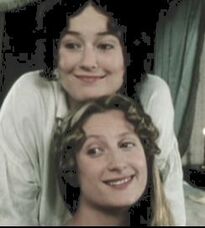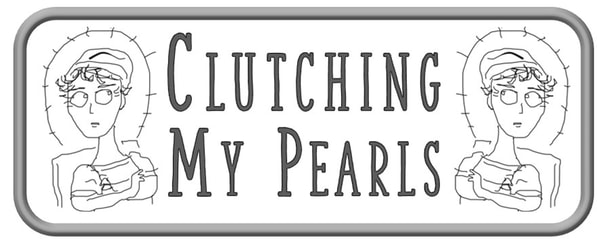| Clutching My Pearls is about Jane Austen. I also read and review the forgotten novels of the Georgian and Regency era and compare and contrast them with Austen's. Click here for the first post in the series. Click here for my six critical questions for scholars. |
 Saucy and sweet
Saucy and sweet Elizabeth Bennet made an unusual main heroine because she was so outspoken and “arch,” as Austen calls her, while demure Jane would never say or even think a critical word against anybody.
I have found another example of this sweet-girl/saucy-sidekick switcheroo, in the sprightly two-volume novel The Portrait (1783) by a “Miss Elliott.”
Maria Bellmont is the sauciest of the saucy. Naturally I assumed she was a saucy sidekick because The Portrait opens with a letter from her sister Charlotte, writing to their friend Harriot Marchmont. I thought Charlotte would be the main heroine, but Charlotte gets married in the first volume, and the lively Maria takes center stage for the rest of the novel.
Not only that, but the deus ex machina in the novel is another "girl power" female, Lady Mortimer, who comes up with a ploy to help Maria win the man she loves.
 The Eyes Have It. Alonso Perez A cloaked beauty 1890
The Eyes Have It. Alonso Perez A cloaked beauty 1890 But I'd better back up to the beginning. The story moves as swiftly as a Russian troika over the frozen steppes, which is where we are told Charlotte and Maria are headed because their father has been appointed to a government post in Russia. Charlotte is unhappy but, heroine-like, accepts her father's decree, even though it breaks her heart to leave behind her friend Harriot’s brother Harry. Maria says of Charlotte: “she can look forward to the dear delights of the Russian Court with all the nonchalance of a philosopher; while I die with impatience to be covered with fur from head to foot; to be whisked over the snow in my elegant carriage, attended by half a hundred freezing beaux, whose only chance of being thawed is by the fire of my bright eyes.”
 Grandpa threatens to disinherit his heir.
Grandpa threatens to disinherit his heir. The sisters' letters to their friend Harriot also set out the backstory of the Bellmonts: Charlotte and Maria’s father is the younger son of a nobleman who threw him off when he married for love. After having two daughters and one son, the mother died, which is very often the case in these novels. Dad hopes to regain some of his lost social standing with the prestigious post in Russia. But when he goes to London to make his final arrangements, he catches a cold and then dies, which means the trip to Russia is off. The girls mourn him, but his death removes the impediment to Charlotte's marriage to Harry. Their brother, Captain Charles Bellmont, is on hand to condole the sisters for the loss of their father and later, to celebrate the wedding.
Maria's plan to slay hearts by the dozens is interrupted when she meets and falls in love with her cousin William, and he with her. But grandfather, who has refused to have anything to do with this branch of the family, forbids the match, as I mentioned.
 Young English Augustinian nun, Paris
Young English Augustinian nun, Paris Maria squares up to reality and resolves she will not do as her own parents did—she will not marry without Lord Bellmont’s consent, or put William in the position of losing his future title and fortune. William swears he won’t give her up, so Maria decides to go into hiding until he calms down and accepts the inevitable. “I am to continue a while to play the part of a heroine.” The characters, particularly Maria, pertly speak of themselves as people in a novel, with remarks like: “and thus ends volume the first of he adventures of William Belmont, Esq. and the fair Maria. Should a second be published, I will send it you.”
When William is distraught over Maria’s disappearance, brother Charles writes: “We durst not leave him to govern himself, so brought him here with us; he raves and storms like any hero, but we shall make shift to manage him, I hope, till we resign that important charge to you; and that I trust, nay am certain, will be soon.”
William would rave and storm even more if he knew that when Maria was travelling by herself to get away from him, her carriage was waylaid by Lord Bellmont’s servants, who take her to a convent in France on his orders. Maria decides to cooperate and go along for the ride rather than bring on a confrontation between William and his grandfather. The plot twist is dramatic, even Gothic, but there is nothing Gothic about Maria’s descriptions of her abduction or the nuns at the convent. “I will only say, it requires more beauty than comes to the share of every female, to look even tolerable in the dress these good souls wear.”
 The heiress elopes
The heiress elopes Meanwhile, brother Charles has been luckier in love. He has married an heiress, and it just happens to be the same heiress that Lord Bellmont wanted his grandson William to marry, so one part of grandpa's plan is thwarted. The new sister-in-law, Anne Bellmont, being of age and an heiress, chose Charles for her husband and eloped with him to Gretna Green, another exxample of female empowerment in the novel. Neither Anne or her sister-in-law Maria believe in affecting false modesty about their charms or their influence on their menfolk.
Maria returns with the Mortimers to England, still not allowing William to know where she is, and she takes an assumed name, Miss Neville. Lady Mortimer invites Lord Bellmont, who lives nearby, to pay her a visit. Maria arranges to be playing the harpsichord and singing when he enters the parlour: “the important moment at length arrived, down I sat, and choosing a song so soft, so plaintive, that it would have melted the heart of a savage, I began…”
A few more performances, and some of her witty repartee, and Lord Bellmont is so enchanted that he invites the Mortimers and their lovely little friend Miss Neville back to his estate. Lady Mortimer encourages him in thinking of Miss Neville as a future granddaughter-in-law. Lord Bellmont only resists on the grounds that he knows his grandson is in love with someone else, but agrees to invite William to come and meet Miss Neville anyway, in the hopes that he'll forget the other chit he's in love with.
 Epistolary heroines
Epistolary heroines The trickery is revealed when, touring Lord Bellmont’s estate, Maria enters the picture gallery and sees her late father’s portrait hanging there. (Hence the title of the novel.) Fortunately for the plot, Grandpa Bellmont never took down the portrait of his disinherited son. Maria cries, "my father, my revered, my beloved father," and faints dead away.
William confesses that the lovely Miss Neville is really the girl he loves, and Lady Mortimer pleads: “Let me, my Lord, implore you to pity those poor children, forget what is past, and let me have the consolation to see that the innocent stratagem I have contrived, has produced the happy effects I so ardently wished.”
Lord Bellmont agrees, as Maria is a “treasure.”
The lovebirds can plan their future and the sundered family is reunited.
Later, Maria saucily recounts a conversation with William: “By Heaven,” [William exclaims, as he embraces her] “I believe Nature never formed your equal.”
“No, certainly,” said I, disengaging myself. “I hope this is not the first time you have been convinced of this incontestable fact. Why, even Lord Bellmont is of that opinion, who has not known my wonderful perfections half so long.”
Happy endings all around, and as I say, when we review the personalities and actions in this novel, it’s all very female-driven. The female characters even give Harry a hard time for getting Charlotte pregnant: “Ah! My poor Charlotte!—what a pretty hand she has made of herself! Dear creature, how I long to see her in her present graceful state!— I could find in my heart, tell her, to give [Harry] Marchmont a lecture for serving her such a wicked trick…”
The Portrait is a nice little Georgian amuse-bouche. There is a passing reference to losing the American colonies, and one mention of Eastern wealth, but the only slaves are the captives of Maria's charms.
Miss Elliot’s identity has not been established. An early reviewer (The European Magazine and London Review) said: “Miss Elliott… is a young Lady in genteel life and sister to the ingenious Mrs. Hall [another novelist]… [she] possesses an uncommon felicity in discriminating characters… The character of Maria, in The Portrait, does Miss Elliot great credit.”
| | Miss Elliott also wrote The Relapse (1780) and The Masqued Weddings (1781). Mrs. Hall’s novel, The Modern Wife (1769) is available on Internet archive. None of Miss Elliott's novels have forewords, which is sometimes a place to pick up some glimmer of information about the author. Now a last detail for the knowledgeable Emma fan: The Relapse begins with the same breezy style in Letter I from Miss Hastings to Mrs. Sidley: 'I long exceedingly to see you, my dear cousin, and no less do I long to see your caro sposo.'" |
| Maria writes that she played the song "Amanda" to charm Lord Bellmont. Not the 1986 Boston power ballad surely. She may be referring to a poem by James Thomson but I have not found a musical version of it. And thou, Amanda, come, pride of my song Form'd by the Graces, Loveliness itself ! Come with those downcast eyes, sedate and sweet Those looks demure, that deeply pierce the soul, Where with the light of thoughtful reason mix .. Or perhaps she is referring to "Amanda's Fair," possibly by the British composer Thomas Arne, who gave us "Rule Britannia." This sheet music is courtesy of the Sibley Music Library, Eastman School of Music at the University of Rochester. The lyrics fit the message that Maria is trying to convey to Lord Bellmont: Amanda's fair by all confessed Her skin soft snowy white As down that clothes the soft turtle[dove]'s breast Her eyes like diamonds bright Yet further still the nymph excels In each celestial grace That midst the heart's soft labryinth dwells Or in the soul takes place. |


 RSS Feed
RSS Feed